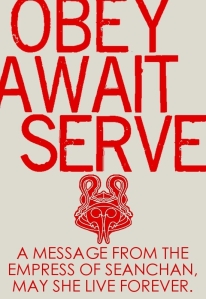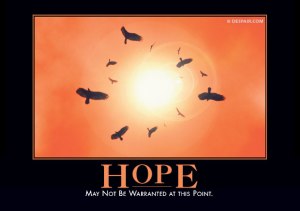 THUD! by Terry Pratchett
THUD! by Terry Pratchett
I love Discworld. I knew that already, but I thought I’d put that back out there. This book didn’t diminish my love of the Discworld by a single whit, though it didn’t inflame it either. It merely reinforced my feelings. Shored it up, say, like timbers in a mine shaft….
Sorry – there’s a lot about Dwarfs in this book, and it kind of gets to you.
In fact, Dwarfs play a pretty huge role in a lot of the stories that take place in Ankh-Morpork, the great cosmopolitan city of the Disc, mainly because they’re a race that, to humans, seems mysterious and difficult to really understand. The dwarfs have their ways, which they don’t share with outsiders, and find it difficult to reconcile living in a socially diverse city while still retaining their essential Dwarfishness. Through the Dwarfs, Pratchett is able to deal with an issue that most modern countries are struggling with in the 21st century – immigration.
Take it from me, it’s tough to live in a foreign country. You grew up with a whole set of rules that worked for you and made sense to you, but you now find yourself in a place where those rules no longer apply. And the new rules you have to play by make no sense and, in some situations, may actually seem downright wrong. The difference between the culture in your head and the one in your life is what we call “culture shock,” and there are several ways of dealing with it.The first is to simply accept it. You’re in another country – they do things differently here. Accept that you’re going to have to play by the house rules, no matter what things were like where you came from. It may feel strange or uncomfortable, but it’s your job to adjust – the world will not change to make you happy, therefore you must change to be happy in the world.
Obviously, this is the option that I believe to be the best one.
Your second choice is to simply leave. If you can’t cope with the new culture, there’s no shame in that. Not everyone is flexible enough to do it. So you gave it a try and it didn’t work. Go somewhere more familiar, someplace where you won’t have to give up so much of what you hold dear.
Obviously this is not an easy option, especially if family or work are involved, but it is an option.
Third, you can pretend that the host culture is inferior to your own and totally disregard it. Band together with your countrymen and form enclaves, miniaturized versions of your home culture where your rules still apply. Isolate yourselves from the surrounding culture, and do whatever is necessary to keep it from wearing yours down.This is popular among the more isolationist cultures – in this book, certain segments of Dwarf society. The problem is that sooner or later, the host culture and yours are going to come into conflict. And odds are, you’re going to lose.
There has been a murder in Ankh-Morpork. A Dwarf has been killed, and they’re ready to blame their ancient enemies, the Trolls. It’s coming up on Koom Valley day, you see, the day in which trolls and dwarfs remember the only battle in the multiverse where, according to the stories, both sides ambushed each other. Trolls hate Dwarfs and Dwarfs hate trolls – that’s how it’s always been, so the logical murderer must have been a Troll.
The problem is that the Commander of the City Watch, Sam Vimes, isn’t so sure. I mean, yes – it’s obvious, but it’s a little too obvious. The Deep Dwarfs, the ones who never come above ground, believe that the murder is beyond Vimes’ jurisdiction, and therein lies the conflict. By trying to keep him out of it, they pretty much ensure that the Watch will investigate this murder, and in the course of doing so, help to uncover a secret that the Deep Dwarfs would do anything to keep from getting out.
This one, THUD! is one of the Vimes Books, which puts it very high in my estimation. Of all the characters he’s written, I like Vimes the best. Granny Weatherwax comes a close second. Basically I really like the old, cynical, take-no-shit characters that take the world into their own hands to do the Right Thing, no matter the cost to themselves. The reason why Vimes tops Weatherwax is that, of all the characters on the Disc, Vimes has had the most growth. In his first book, Guards! Guards!, he was a drunk and a failure, the nominal chief of the shadow of a night watch. Enter Carrot Ironfoundersson and a dragon, and Vimes’ path was set.Now he’s a Duke, Commander of the Guard, married to one of the richest women in the city and the proud father of a toddler. He has everything. In fiction, this is never a good place to be….
The themes of this book are varied. There is, of course, the theme of culture clash – how much should one be allowed to keep the culture one grew up in? How many concessions must you and society make in order to keep everyone happy? The answer, in case you were curious, is hard to pin down, but it is most certainly not “none.”
 It’s also about fatherhood, though that’s more of a character-building theme for Vimes. He has a son now, and he has dedicated himself to his boy. Every night at 6:00, he reads their favorite book, Where’s My Cow to his son (a book that you can also buy, coincidentally enough). He cannot – must not be late for this. Not even by a minute, and certainly not for a good reason. Because if you’re willing to break a promise for a good reason, pretty soon you’ll be breaking it for a bad one. And it is this kind of personal, rock-solid integrity that keeps me coming back to Vimes.
It’s also about fatherhood, though that’s more of a character-building theme for Vimes. He has a son now, and he has dedicated himself to his boy. Every night at 6:00, he reads their favorite book, Where’s My Cow to his son (a book that you can also buy, coincidentally enough). He cannot – must not be late for this. Not even by a minute, and certainly not for a good reason. Because if you’re willing to break a promise for a good reason, pretty soon you’ll be breaking it for a bad one. And it is this kind of personal, rock-solid integrity that keeps me coming back to Vimes.
If you’re already a Discworld fan, you don’t need my urging to pick this one up. It’s not the best of them, but it’s certainly a good read.
——————————–
“For the enemy is not Troll, nor is it Dwarf, but it is the baleful, the malign the cowardly, the vessels of hatred, those who do a bad thing and call it good.”
– The Diamond King, THUD!
——————————–








































